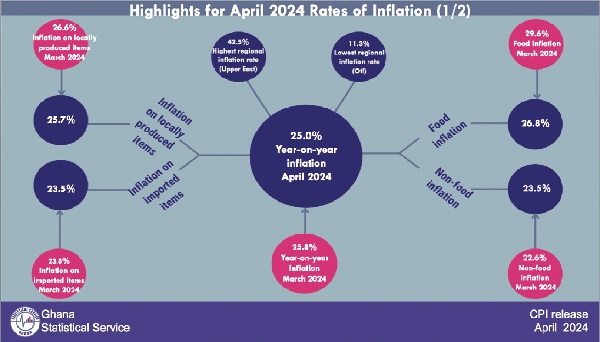
Inflation drops marginally in April — Rate now 25% against 25.8% in March
Ghana’s inflation dropped marginally in the month of April this year, to 25 per cent.
This represents a slowdown by 0.8 per cent from the 25.8 per cent rate recorded in the month of March 2024.
This means that in the month of April 2024, the general price level was 25.0 per cent higher than April 2023, while Month-on-month inflation between March and April 2024 was 1.8 per cent
Food inflation per the figures released by the Ghana Statistical Service (GSS) was the major contributor to the overall drop in the rate of inflation recording a rate of 26.8 per cent.
That is the lowest in 13 months. Non-food inflation on the other hand was 23.5 per cent.
IMF caution
Much as the rate of inflation in the country has slowed, the rate as compared to Bank of Ghana’s projection for the year, is still too high and a source for concern.
For instance, the International Monetary Fund (IMF) has earlier in the month cautioned countries such as Ghana, which still have inflation above its central bank’s target range, to continue to maintain a tight monetary policy.
The fund was of the view that although inflation in such countries might have been on a consistent decline in recent months, it was still too early to relax monetary policy rates, a development which will not excite businesses which are rather clamouring for lower policy rates to impact the cost of borrowing which is too high.
The Breton Wood institution believes that central banks could only pause on increasing their policy rates, stressing that it would be too early to reduce them.
Headline inflation in sub-Saharan Africa has been declining since reaching its peak in November 2022, with the situation varying across countries.
Based on the latest available data from February 2024, roughly a third of the countries including Ghana still face double-digit inflation, largely due to significant currency depreciations and large imports.
Rough times
Ghana’s economy has been battling with high inflation, with the rate reaching a 22-year high and a peak of 54.1 per cent in December of 2022.
In response to the rising inflation, the Monetary Policy Committee of the Bank of Ghana kept a tight monetary policy stance by consistently increasing the policy rate to 30 per cent by the end of 2023.
With inflation easing in 2023, reducing to 23.2 per cent in December 2023, the central bank, for the first time in two years, reduced the policy rate to 29 per cent in January 2024 and has since stayed it citing volatile economic conditions among other factors.
It is not immediately clear what the next line of action of the Bank of Ghana will be with inflationary pressures still very much lingering.
However, some believe that with 2024 also being an election year, the central bank might relax the policy rate to spur economic growth.
Measurement
Govt Statistician, Professor Kobina Anim, in explaining the measurement of inflation said price collection was done in 57 markets and from about 8,337 outlets.
The prices are collected for approximately 47,800 products every month from 16 regions.
Products are ordered in a hierarchy of 13 divisions, 44 groups, 98 classes, 156 subclasses and 307 items.
He said every item could only be part of one subclass and every subclass could only be part of one class among other things.